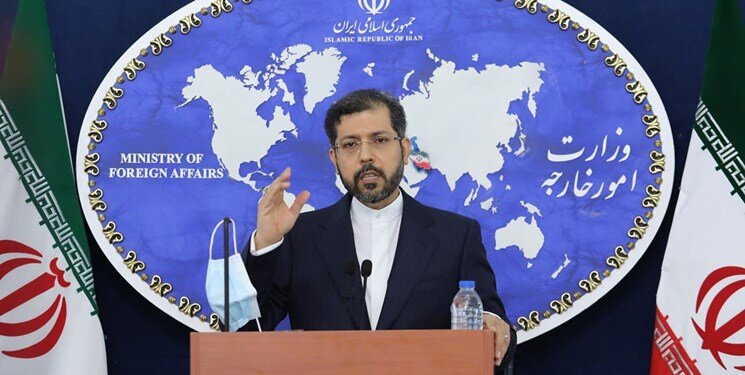Iran warns U.S., UK against appeasing Israel on JCPOA

TEHRAN – Iran has responded to comments by the American and British top diplomats on the 2015 Iran nuclear deal during their visits to Israel, warning them against appeasing Israel.
Saeed Khatibzadeh, spokesman for Iran’s Foreign Ministry, said in a tweet that the foreign ministers of the U.S. and the UK are trying to appease the sworn enemy of the nuclear deal, officially known as the Joint Comprehensive Plan of Action (JCPOA).
“To appease the sworn enemy of JCPOA, UK/US FMs spin goals of Vienna Talks. Disappointing! The brutal Israeli regime you try to placate has done its utmost to torpedo the deal. Instead of eroding your credibility, focus on reviving the original deal—the ONLY solution on the table,” Khatibzadeh said on Twitter.
The spokesman was responding to remarks by UK Foreign Secretary Dominic Raab and U.S. Secretary of State Antony Blinken who both had called for a “stronger” deal with Iran during separate visits to Israel.
During his visit to Israel, which came after the recent flare-up between the Gaza Strip and Israel, Blinken said the U.S. is seeking a “longer and stronger” deal with Iran.
In an interview with Israel’s Channel 12, Blinken said, “if Iran returns to compliance with the deal, we would do the same.
We would also seek to make it, as we say, longer and stronger. And we’d also work hard to engage the other issues where Iran is a very dangerous and problematic actor for us and for Israel – destabilizing activities in the region, proliferation of weapons, support for terrorist groups, et cetera.
All of those things.”
Raab also echoed the same thing during his visit to Israel. After a meeting with his Israeli counterpart Gabi Ashkenazi, Raab said the UK is committed to achieving a “stronger” deal with Iran.
“Reiterated the United Kingdom commitment to a two-state solution, the importance of a stronger nuclear deal with Iran & our commitment to Israel’s security in my meeting with @Gabi_Ashkenazi today. Vital we make progress towards a more positive future for Israelis and Palestinians,” Raab said on Twitter.
The remarks came as the fifth round of nuclear talks in Vienna between Iran and the remaining parties to the JCPOA were resumed on Tuesday. Iran’s Deputy Foreign Minister Seyed Abbas Araghchi visited the Austrian capital for nuclear talks that are aimed to revive the 2015 nuclear deal.
“Today, the fifth round of our negotiations with the Joint Commission of the JCPOA, which consists of Iran and the P4+1 countries, began, and we had the first meeting of the Joint Commission. Work will continue by working groups in both nuclear area and sanctions lifting, and a third working group on how to implement the agreements will also continue,” Araghchi told state media Tuesday after a meeting of the JCPOA Joint Commission, which marked the beginning of the fifth round of the nuclear talks.
He added, “All parties are still serious and have taken these talks seriously, many delegations are hoping that this round can be the last round of talks and we will reach a conclusion. You can have such hope, but you have to be a little bit cautious. The issues that remain to be finalized and decided are still important issues, although their number has decreased and we have made great strides in writing the text in previous periods. We can move forward further, but the few issues that remain are still key issues that need to be decided.”
Araghchi echoed the same assessment in an interview with Press TV. He told the English-language broadcaster that he still cannot ascertain that a conclusion was possibly within reach despite progress made on some key differences over reviving the landmark deal.
“In the last round, we were able to make some meaningful progress in our negotiations but still there are some key issues to be resolved,” Araghchi said.
“I cannot say that we are able to conclude our job in this round of negotiations but this is possible; it depends on how much we are able to make progress on key issues and how much the other parties are prepared to make their own difficult decisions,” the Iranian deputy foreign minister underlined. “I am not confident that it would be possible to conclude the negotiations but there is a possibility.”
